The Ministry of Culture still functioned during the coronavirus pandemic with intense activity in venues to spread culture nationwide.
In 2021, ministry’s intellectual and artistic programmes saw a huge turnout after successful efforts to control the disease, raise public awareness and put precautionary health measures in place.
This year the ministry created new facilities in order to combat extremism and promote positive values. Many initiatives were launched to discover and develop talented and creative people and protect cultural heritage.
Among the ministry‘s achievement for this year are the first phase of Ismailia Culture Palace and Port Said Cinema, the Book Authority outlet in Port Fouad, developing the Mahmoud Khalil Museum, opening el-Arish Culture Palace after 10 years of closure, developing Maidan al-Mahatta Square in Tanta, the opening of the Egyptian Public Library in Ezbet el-Borg, Damietta, developing the Hadraba cultural palace in Red Sea Governorate, opening Dr. Nihad Saliha’s theatre and the new building of the Higher Institute of Cinema at the Academy of Arts in Giza, the Tami El-Amid Culture Palace in Dakahlia and the el-Salam Cultural Library in Aswan.

International cooperation
Despite the restrictions imposed by the Covid-19, this year witnessed the largest Egyptian promotion of cultural diplomacy in international forums. In the same context, artist and Minister of Culture Enas Abdel Dayem handed over the presidency of the Conference of Ministers Responsible for Cultural Affairs in the Arab World in the UAE to launch and discuss the topic of Reviewing the Comprehensive Plan for Arab Culture’ in conjunction with Dubai Expo.
Also, 2021 saw the extension of the appointment of the Egyptian Minister of Culture as head of the Arab Music Complex for another four years.
The ministry also renewed cultural protocols between Egypt and other countries.
A memorandum of understanding was signed between Egypt and Burundi in the cultural field on the sidelines of the meeting of President Abdel Fattah el Sisi and his Burundian counterpart Évariste Ndayishimiye, in Cairo.
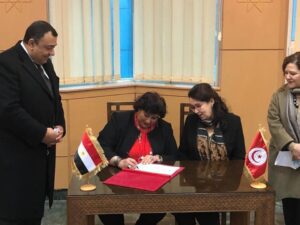
Another protocol was signed by Ehab Nasser, Ambassador of the Arab Republic of Egypt to Russia and Olga Yarblova, Deputy Minister of Culture of the Russian Federation. The protocol was signed on behalf of the governments of the two countries to announce 2021/2022 the Egyptian-Russian Humanitarian Year, according to which a number of joint activities were established between the two countries.
In addition to holding International Cooperation between Egypt and the Sierra Leonean, Jordan and Tunisia.
The Ministry of Culture also donated its publications for foreign libraries in the world with the aim of introducing Egyptian culture, including the Shanghai University for International Studies, Museum of the History of Writing and Printing in China, Center for Chinese-Arab Studies for Reform and Development, National Library in Djibouti, Library of the Red Sea State in Port Sudan. It also dedicated a large number of publications to South Sudan to be the basis for the establishment of a national library and also to the Saint Lazarus Library in Portugal.
As part of its active participation in international events, the Ministry of Culture organised the Egyptian pavilion at the Venice Biennale and 17th Venice International Biennale of Architecture.
The Egyptian Academy of Arts, implemented the first ‘Speak Arabic’ lessons under the auspices of President Abdel Fattah el Sisi and within the initiative of the Ministry of Immigration and Egyptian Affairs Abroadin order to enhance the identity of the Egyptian community.
It also organised a number of handicraft workshops to highlight Egyptian heritage in co–operation with the Cultural Development Fund, in addition to launching a series under the title ‘Museums and Palaces in Egypt’ for all museums affiliated to the Ministry of Culture as well as museums affiliated to the Ministry of Tourism and Antiquities.
The initiative aims at promoting and shedding light on the distinctive cultural and civilisational manifestations in Egypt.
The ministry also organised many cultural series about masterpieces of Islamic architecture entitled ‘Mosques in Egypt’ and it also launched a new series of videos entitled ‘The Discovery of Masterpieces of Egyptian Art in the World’.
The Academy of Arts in Rome, in the closing ceremony of the academy’s cultural season 2020-2021, organised a festival on the occasion of the 150thanniversary of the premiere of the opera Aida.
Also, the opening ceremony of the new cultural season of the Academy of Arts in Rome 2021-2022, included a celebration of Port Said as the capital of Egyptian culture in 2021, an exhibition of historical documents related to the founding of Port Said and the Suez Canal in cooperation with the National Library and Documentation House.

International and local festivals
The Ministry of Culture organised a number of international and local festivals during 2021, such as the 30th Arab Music Festival and Conference, the 29th Salah El-Din Citadel International Festival for Music and Singing, the 43rd Cairo International Film Festival, the 14th National Egyptian Theater Festival, Cairo International Festival for Experimental Theatre, the 11th Tahtib Festival, in addition to the celebrations forchoosing Port Said as the capital of Egyptian culture.

Theatre activities
State-owned theatres witnessed intense activity during 2021, as the Egyptian Opera House presented in its theatres in Cairo, Alexandria and Damanhour 926artistic and cultural activities.
The Artistic House of Folk and Performing Arts presented 343 nights of performances. The National Circus in Agouza, Gamasa, May 15 City and othervenues presented 500 nights of performances. The Reda Folk Dance Troupe and the National Troupe for Folk Art and National Folk Music Troupe presented573 show nights.
Travelling theaters
One of the main projects of the ministry is the travelling theatre project as it aims at raising awareness and spreading culture in underprivileged areas in Egypt.
Within the mobile theatre project, the Ministry of Culture organised 347 activities in 41 villages from 9 governorates: Minya, Fayoum, Beheira, Dakahlia, Sharkia, Luxor, Red Sea, Qena and Aswan, which included plastic arts and heritage crafts workshops, talent discovery, art shows, book fairs and educational lectures. The events have benefited over 35,000 citizens.
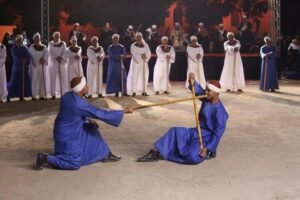
Preserving identity and protecting heritage
Within the framework of the Ministry of Culture’s strategy to preserve identity and protect heritage, Egypt, in coordination with Saudi Arabia, Lebanon, Jordan and Tunisia, succeeded in registering Arabic calligraphy on UNESCO’s urgent safeguarding lists of the intangible cultural heritage. It has previously registered Al-Sira Al-Hilali, Al-Tahtib, Al-Aragoz, practices associated with palm trees and hand-weaving in Upper Egypt.






















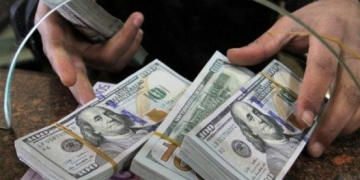










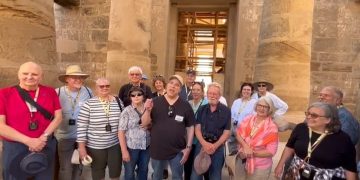


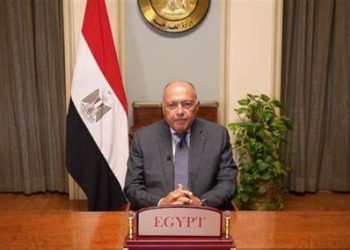



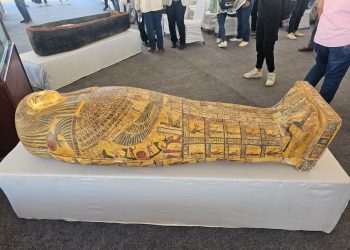









Discussion about this post